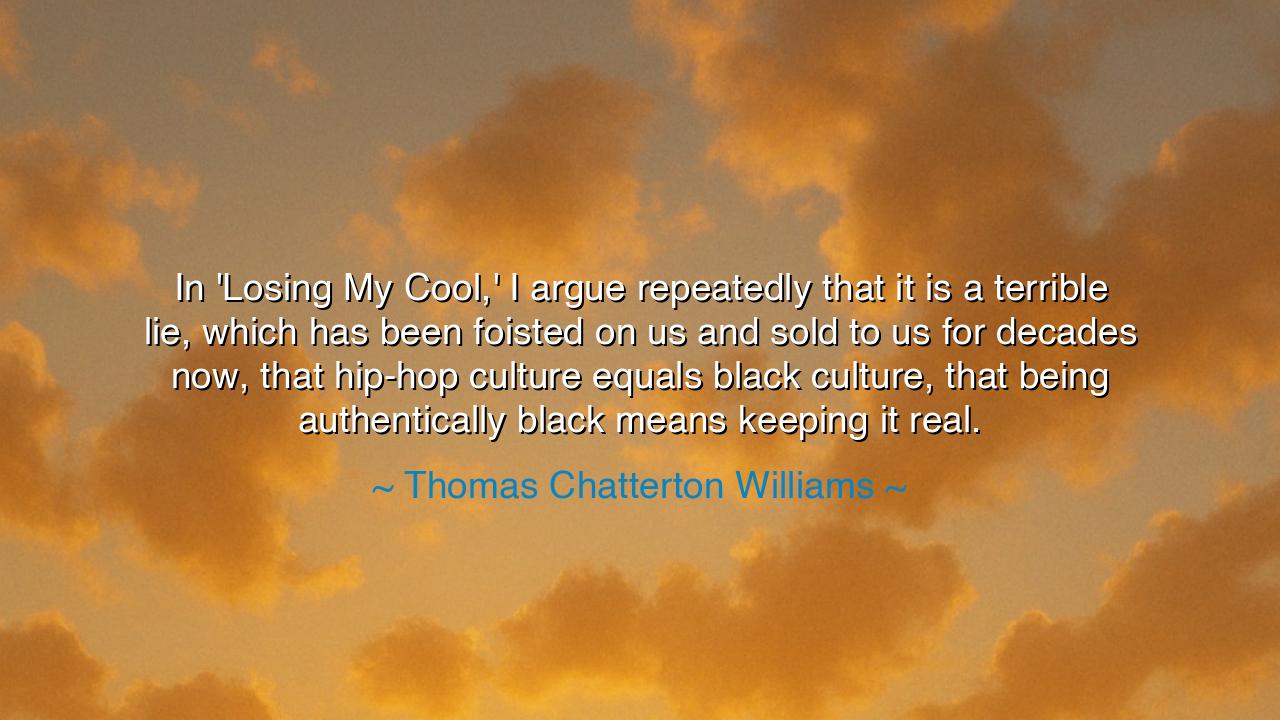
In 'Losing My Cool,' I argue repeatedly that it is a terrible
In 'Losing My Cool,' I argue repeatedly that it is a terrible lie, which has been foisted on us and sold to us for decades now, that hip-hop culture equals black culture, that being authentically black means keeping it real.






"In 'Losing My Cool,' I argue repeatedly that it is a terrible lie, which has been foisted on us and sold to us for decades now, that hip-hop culture equals black culture, that being authentically black means keeping it real." These words by Thomas Chatterton Williams carry a profound truth about the ways in which identity and culture are often distorted and manipulated. Williams speaks against a powerful myth, one that has been perpetuated over time, linking hip-hop culture to the very essence of black identity. The idea that to be authentically black is to "keep it real"—to live and breathe the very essence of hip-hop—is, as Williams argues, a lie. It confines the richness and diversity of black culture into a narrow, one-dimensional box, ignoring the multitude of experiences, expressions, and histories that exist within the black community.
In ancient times, identity was not something easily prescribed by external forces. A person’s sense of self was shaped by a combination of ancestral wisdom, personal experience, and the greater community to which they belonged. Take, for example, the Greeks—though they are often remembered for their philosophy and democracy, they also had a multitude of cultural expressions. The philosopher Socrates and the warrior Achilles both shared a Greek identity, yet their paths were vastly different. In the same way, black culture is not a singular entity defined by any one form of expression, be it hip-hop or anything else. To claim that being authentically black is to adopt one form of culture is to overlook the depth and breadth of the black experience.
Williams’ challenge is not just to hip-hop culture, but to the way in which society—both internally and externally—has sought to reduce black identity to a simple formula. Hip-hop, in its raw and authentic form, is an art that emerged from the streets as a powerful voice for those who had been oppressed and marginalized. It is an expression of survival, a revolutionary art form that spoke truth to power. Yet, the idea that hip-hop is the sole expression of blackness dismisses the countless other traditions, art forms, and ways of being that have existed long before and alongside it. To define blackness by one cultural expression is to deny the richness and complexity of a people’s history and lived experiences.
Consider the example of W.E.B. Du Bois, a towering figure in African American thought, whose ideas about black identity were shaped by his experiences in both the United States and Europe. Du Bois recognized that black identity was not a monolithic experience but was shaped by history, education, geography, and social status. He argued that being black in America involved both struggle and intellectual engagement—an existence that was as rich in scholarship and civil rights as it was in culture and history. In a similar vein, Williams challenges the reductionist view that blackness must adhere to a singular expression, asking for a broader, more inclusive understanding of what it means to be black.
In the modern world, where stereotypes and cultural appropriation often shape the narratives around marginalized groups, Williams calls for a shift in the way we think about identity. The image of "keeping it real" has been sold to the world as the defining marker of black authenticity, but it is a trap—a way of flattening the multifaceted and ever-evolving nature of blackness into a rigid formula. To define blackness by hip-hop is to erase the nuances and diversities of black existence, making it seem as though one must fit into a pre-determined mold in order to be authentically black.
The lesson we must draw from Williams’ words is this: identity cannot and should not be confined to any one expression, whether it be hip-hop, race, or any other external marker. To be authentically human is to embrace the fullness of one’s own experience and heritage, to reject limitations and stereotypes placed upon us by others. Williams urges us to break free from the idea that our worth is tied to a single cultural expression or any one version of what it means to belong to a group. Just as black culture is vast and diverse, so too is every individual experience—shaped by family, community, history, and personal journey.
Let us take action by embracing diversity in our understanding of identity and culture. We must reject the temptation to reduce any group to a single story or image. Instead, let us celebrate the complexity and multidimensionality of every person’s experience. True authenticity comes from within—not from the pressures of fitting into a narrow, prescribed box. We must honor our diverse backgrounds and histories, knowing that our humanity is far richer and more expansive than any one definition or expectation. Just as Williams calls for a broader, more inclusive understanding of blackness, so too must we learn to embrace the infinite possibilities of who we are as individuals and as a collective.






AAdministratorAdministrator
Welcome, honored guests. Please leave a comment, we will respond soon